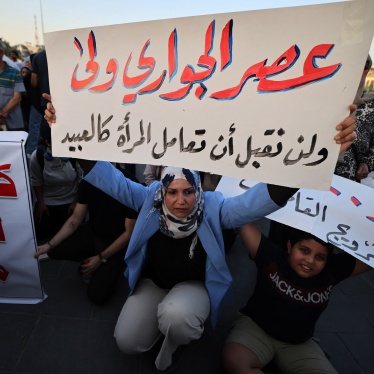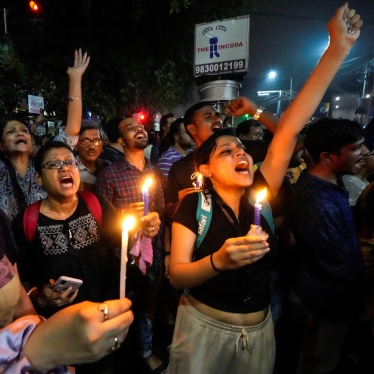April 27, 2015
His Excellency Ban Ki-Moon
Secretary-General of the United Nations
United Nations Secretariat
New York, N.Y. 10017
Re: 2015 Report on Children and Armed Conflict
Dear Mr. Secretary-General,
I am writing about your 2015 annual report to the Security Council on children and armed conflict, prepared by your Special Representative, Leila Zerrougui. We understand that your office recently received the draft report, including the annexed lists of perpetrators of violations against children, for your final review and approval.
We consider this report, together with its annexes of parties to armed conflict that commit violations against children, a vital tool to protect children in war. We therefore recommend that you apply consistent criteria when determining which parties to list, including all armed forces and non-state armed groups where there is credible evidence of a pattern of violations, and that you resist undue political pressure to keep certain parties off the list.
In February, Human Rights Watch submitted a memo to Ms. Zerrougui, which we are also providing to your office. The memo listed serious violations of international humanitarian law against children–recruiting and using children in operations, killing and maiming children, sexual violence against children, and attacks on schools or hospitals–committed in 2014 by more than 29 armed forces or armed groups in 14 countries, based on witness and victim accounts and other research conducted by Human Rights Watch. We also made several recommendations for inclusion in the Secretary-General’s report.
One of the key recommendations was to apply consistent standards when listing armed forces and armed groups in the formal annexes. In your 2010 report, you stated that the threshold for inclusion in the annexes is a “pattern” of violations involving a “multiple commission of acts” (para 175, S/2010/181). To date, some parties to armed conflict that have committed grave violations against children have not appeared in the annexes despite apparently meeting this standard as evidenced by repeated references to their abusive conduct in the report’s text.
A number of actors stand out in this regard. For example, militant groups in Pakistan carried out at least 78 targeted attacks against schools, teachers, and schoolchildren in 2013; in December 2014,a militant group's targeting of a school in Peshawar killed over 100 children. Violations by armed groups in Thailand and India have been mentioned repeatedly in recent reports, including attacks on at least 11 schools and killings of at least 13 teachers in 2012-2013 by armed groups in southern Thailand, and, according to your report last year, the recruitment of an estimated 2500 child soldiers by Maoist rebels in India. Violations by parties in Israel and Palestine have been referenced in the body of every report since 2005. We are particularly concerned by recent media reports alleging that Israeli officials have pressured UNICEF officials in Jerusalem not to consult local organizations about including Israel in the annexes.
In addition to other parties that have committed multiple grave violations against children, we believe that inclusion on the list of Israel and Palestinian armed groups is overdue. Alleged violations by Israel in 2014 include:
• The unlawful killing of children in the West Bank, such as the 17-year-old boys Nadim Nawareh and Mohammed Salameh, whom Israeli forces shot and killed on May 15 in Beitunia, and 15-year-old Mahmoud Dudeed, shot and killed on June 20 in Dura.
• Unlawful deaths of children from Israeli attacks in Gaza, including the killing of four boys on July 16 near the Gaza City port, the killing of nine civilians, including two 15- year-old boys, at a cafe near Khan Yunis on July 9, and the killing of two children and five of their relatives when witnesses said two missiles from an airstrike hit their home in the densely crowded Khan Yunis refugee camp on July 10. (An eighth casualty in the July 10 attack had joined the Qassam Brigades, a Palestinian armed group, a few months previously, but he did not yet have a rank in the group, indicating that the attack was disproportionate if not indiscriminate.)
• Unlawful attacks on or near three schools in Gaza housing displaced people that in total killed 46 civilians, including 17 children.
• The use of at least two schools in Gaza as a base by Israeli military forces during the
July/August operation in Gaza.
Abuses last year by Palestinian armed groups, including Hamas's armed wing, include:
• The repeated launching of indiscriminate rockets and mortars into Israeli population centers, killing five civilians, one of them a 4-year-old child. These unlawful attacks severely disrupted life in southern Israel, leading thousands of people, including families with children, to leave their communities temporarily in search of safety, and forcing children to repeatedly seek safety in bomb shelters.
• The repeated launching of rockets from populated areas in Gaza, placing children and other civilians at risk of retaliatory attacks.
• The use of at least three schools in Gaza to store weapons.
The cases identified above are those that took place in 2014 that Human Rights Watch has documented directly. In your own reports, you have cited many more instances of grave violations against children in Israel and Palestine, based on information collected by the UN’s Monitoring and Reporting Mechanism on children and armed conflict. For example, your report on violations in 2013 cites nearly a dozen cases of Palestinian children killed by Israeli security forces; over 1.200 Palestinian children injured; and forty-one education-related incidents of damage to schools facilities, interruption of classes and injury to students where Israeli security forces were responsible. The report also cites violations by Palestinian armed groups, including the firing over 63 rockets from Gaza into Israel, resulting in school interferences for 12,229 Israeli children.
We believe in the cases of Israel and Palestinian armed groups your standard of a pattern of violations involving a multiple commission of acts has been met, and note that other parties to armed conflict have been listed in your annexes in the past for less serious violations.
We are concerned that the omissions of armed forces and armed groups, when their repeated violations have been well-documented, damages the integrity of the Secretary-General’s list, and therefore its impact. We have seen the positive results of your report in many conflicts around the world, and do not wish to see those results diminished.
We hope you will adopt a clear and consistent approach, listing all parties where credible documentation of a pattern of violation exists. We also urge that you publicly reject any attempts by Israeli officials to intimidate your staff, otherwise they or officials from other countries and armed groups may infer that they can influence your reporting in this way.
Thank you for your consideration.
Sincerely yours,
Philippe Bolopion
United Nations and Crisis Advocacy Director
cc: Leila Zerrougui, Special Representative to the Secretary-General for Children and Armed Conflict







